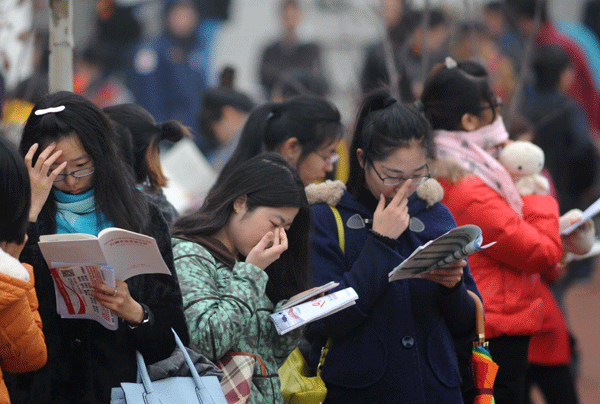 |
| Students review before entering a local examination room for this year's national civil service test in Yantai, Shandong province, on Sunday. Interest in taking the test has seen a sharp drop this year. (China Daily Photo) |
The number of people who were approved to take the national civil service exam and the number who actually took it have dropped from previous years, and part of the reason
may be the Party's continuing anti-corruption efforts, experts and insiders say.
The annual exam is required for one to be hired by the central government and work as a civil servant. Millions of people take part every year, because being a civil servant is considered a decent and stable job that offers a good salary.
This year, the exam was held on Sunday. However, although 22,000 positions were offered - 3,000 more than last year - only about 1.41 million people were qualified to take the exam, and 1.05 million took it, the State Administration of Civil Service said.
Both figures are recent lows. Last year, 1.52 million people were approved to take the exam and 1.12 million took it to compete for 19,000 posts.
Liu Xutao, a professor who researches the exam at the China National School of Administration, said the drop has something to do with the Party's and the central government's consistent efforts to fight corruption.
"In the past, people liked to work as civil servants because they thought they could get a lot of 'invisible welfare' through their posts," said Liu.
However, as the anti-corruption campaign continues, the civil servant system has been managed more strictly. Meanwhile, the income and welfare of civil servants has become more widely known, primarily through online sources.
"Under such circumstances, government jobs may lose their attraction to some people, especially to those who intended to achieve additional income and welfare through their posts," Liu said.
Li Yongxin, president of Beijing Offcn Future Education Consulting Co, a private institution that offers training for the civil service exam, agreed with Liu on the anti-corruption campaign's impact. But he also gave some other possible factors that contributed to the situation.
"The registration and selection process for the exam are becoming more scientific," Li said, adding that job descriptions are clearer and more targeted.
"In addition, applicants, most of whom are college students who are graduating in 2015, now have clearer occupational plans and are therefore more realistic about the exam," Li said.
Li said most college graduates today were born in the 1990s. "They received good employment guidance at college and have clearer career goals. If they don't want to become civil servants, they would not follow the general trend blindly to take the exam," he said.
Li Qing, a postgraduate who is studying journalism and communication at Beijing Normal University and will graduate in 2015, didn't register or take the exam.
The 24-year-old wanted to land a job related to her major. She said she scanned the job descriptions on the civil service posts but didn't find one that fits her major or interest.
"So I didn't bother to take part," she said.
(For the latest China news, please follow @PDChina on Twitter at http://www.twitter.com/PDChina and @PeoplesDaily on Facebook at http://www.facebook.com/PeoplesDaily)
 Market a new tool to manage megacities
Market a new tool to manage megacities New rules set to boost commodities trading
New rules set to boost commodities trading Convent in the clouds
Convent in the clouds Why is it so hard to be vegetarian in China?
Why is it so hard to be vegetarian in China?Day|Week|Month